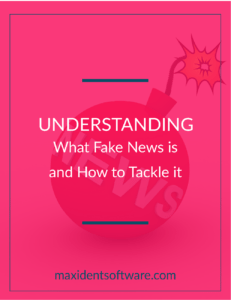
What is fake news?
There will be opposing views on what constitutes fake news, but the unifying theory is that fake news is news that is not based on fact but rather feeling, opinions and skewed results. Some websites are only meant to entertain and satirize, such as The Onion and Amplifying Glass. They are only supposed to hook you in by using an over-the-top writing style. They make fun of the news. However, the type of fake news we need to be wary of is the type that is clicked and shared and treated like real news (when it so clearly isn’t). Unfortunately, in an era where technology is king and we rely on the internet for our news, “fake news spiked on Facebook, overtaking real news in August (2016).” This is according to Buzzfeed’s Craig Silverman as he “was one of the first people to recognize those problems and has been tracking the growth of fake news on the internet for years.” He has even said that “this year, 2016, it’s incomparable to the other years I’ve looked at.” We are now being bombarded by fake news not just from sites we can’t get enough of, like Facebook and the increasingly popular blogging site, Tumblr, but from the mouths of political figures and people willing to back them.
It’s distressing watching the news (I’ve been watching CNN a lot recently) to find that even they are trying to dispute false claims that have come out recently, regarding a “document dump” and an unfair conflation of their news agency with another not so reputable one. It has been the topic of their broadcasts for days now and it doesn’t seem to be slowing down, either. With facts now seeming to take a backseat to opinions or even cold hard falsehoods, the truth and the facts are starting to lose ground. It’s getting so bad that fake news is actually being treated like real news. In an article on the abcnews.go.com website, a fake news story was shared so much that legitimate news media picked it up and later “issued an on-air apology for reporting it.”
How does this affect you and your patients?
With fake news making the rounds, everything is going to come into question, including the jobs you do and the values you hold as healthcare professionals. Let me give you an example of how this disease has already spread. Back in August of 2016, a flood of news items came out suggesting that flossing had no significant effect on preventing cavities and tooth decay. The flossing controversy made a huge impact on the dental community, bringing forward the entire industry to shoot down the false claims. I even talked about the ways in which you could convince your patients of the benefits of flossing in a previous blog post.
With fake news at an all-time high, and people seeking it out to confirm what they think or they want to be true, it is possible that this can hurt the most important part of your practice– the patients. After the news surfaced about the flossing controversy, a member of the Editorial Advisory Group for the Canadian Dental Association commented with this: “By presenting faulty or incomplete information, without proper context, to those who might be looking for justification not to floss, these stories could jeopardize the public’s oral health.”
How do you tackle fake news?
It is time to allow facts to become your weapon of choice and keep up-to-date on what’s going on in your industry. One example of fighting back with facts comes from Kait Parker, a TV meteorologist who responded to a falsified report using information from their station to claim that the earth wasn’t warming but cooling. Click this link to see what she did about it:
Parker says this in the video. “Here’s the thing: Science doesn’t care about your opinion. Cherry-picking and twisting the facts will not change the future, nor the fact—note, fact, not opinion—that the earth is warming.” And she used updated information and clear facts to make her point.
You don’t have to make a video the way Parker did, but the point of her video was to reach as many viewers as possible with the truth. When it comes to refuting fake news, it is just as important to reach your loyal patients as it is to reach prospective ones. To reach prospective patients, utilize areas of your website. Provide legitimate articles on updates and breakthroughs, start a conversation in a forum or publish a blog post. Not only will this help to tackle fake news in your industry, it will solidify your authority as an expert in your field by staying one step ahead. Patient education can also play a crucial role, especially with your existing patients. Take the time to open up a dialogue with them about fake news and how to identify it. The more information you arm your patients with, the less likely it will be for them to get sucked in by the allure of fake news.
Below I have provided resources with more information on fake news and its effects on society. Feel free to leave us comments on how you tackled the flossing controversy in your office and how you plan to tackle other false information in the future. As always, we love to hear from you.
Resources
- https://docs.google.com/document/d/10eA5-mCZLSS4MQY5QGb5ewC3VAL6pLkT53V_81ZyitM/preview
- http://www.refinery29.com/2016/12/132247/how-to-spot-fake-news#slide
- http://abcnews.go.com/Technology/fake-news-stories-make-real-news-headlines/story?id=43845383
- http://oasisdiscussions.ca/2016/08/26/floss/
- http://www.elle.com/culture/career-politics/news/a41274/kait-parker-weather-channel-breitbart-response/
- http://fakenewswatch.com/



